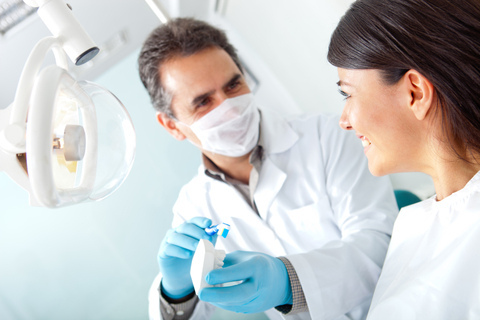
Some bone changes are a normal part of aging. Bone density starts decreasing around the age of 30, hormonal changes affect bone strength as we grow older, and the mineral content of our bones can change over time. Even as we live longer, healthier lives, some changes in our bones are often a normal part of the aging process.
But note we said “often,” not always! Decades ago, a sunken jaw, thinner lips, sagging facial muscles, and an altered profile were considered just another normal consequence of aging. This “collapsed” look was caused by bone loss in the jaws, especially the mandible, or lower jaw.
Today we know that maintaining size and density in our jawbones is important not only for our appearance, but for better oral health. Even better, we know several easy practices to keep those bones their healthiest. And, should your jawbone be affected by bone loss, Dr. Robee Bailey Jr., DMD can offer many options to restore both function and appearance.
Brushing twice a day, flossing daily, using fluoride toothpaste, seeing your dentist for regular exams and cleanings—when you follow recommended dental hygiene practices, you are doing more than simply preventing cavities; you are making sure you keep your teeth for a lifetime. And, because tooth loss inevitably leads to bone loss over time, you are protecting your bones as well.
The bone tissue which supports our teeth needs the stimulation of biting and chewing to stay healthy. Without that stimulation, bone area under a missing tooth gradually shrinks. The bone tissue is resorbed into the body, which, in a relatively short amount of time, can lead to a noticeable sunken spot where the tooth used to be. A dental implant will provide the tissue stimulation that a natural tooth would, and will prevent future bone loss in the jaw. And even if bone tissue has already been lost, Dr. Robee Bailey Jr., DMD can recommend surgical bone grafting to achieve the right bone area and density to hold an implant.
- Don’t Neglect Your Gum Health
One of the most common causes of bone loss in the jaw is periodontal disease. For older patients, gingivitis, left untreated, can eventually lead to periodontitis (severe gum disease). This condition leads to the formation of pockets between your gums and teeth that become home to bacteria and infection. This infection can cause deterioration in the bone structure supporting the teeth.
Making sure you schedule regular dental exams will allow Dr. Robee Bailey Jr., DMD to treat any signs of periodontitis when they are first detected. If you have any of the symptoms of gum disease, it’s important to treat the cause of these symptoms as soon as possible to protect your gums, teeth, and the jawbone beneath them.
Gingivitis can be reversible with proper care. Deep cleaning procedures such as scaling and root planing, topical and oral antibiotics, and oral surgeries such as flap surgery or bone and tissue grafting can help reverse the effects of periodontitis. Bone loss cannot be reversed, but a graft can replace lost bone and allow healthy tissue to regenerate.
- Consider implant-supported dentures
If you have suffered major tooth loss that requires a full or partial denture, consider appliances that are supported by implants. Remember, the loss of a single tooth causes resorption of the bone beneath it. If you are missing several or all of your teeth, your jawbone will shrink over that entire expanse of the alveolar ridge, the part of the jawbone which holds your teeth in their sockets.
Because dentures provide no stimulation to the underlying bone, normal bone resorption takes place. To add to the problem, the pressure of the denture on the ridge causes the bone to wear away further. As the bone continues to deteriorate, you will notice that the dentures no longer fit as well as they once did. For this reason, dentures often need to be replaced after a few years.
Implants, on the other hand, provide the same kind of pressure and stimulation to the jawbone that natural teeth do. The denture is securely attached to the implant, and doesn’t put harmful pressure on the bone below. Besides their natural appearance and secure fit, preventing further bone loss is a wonderful additional benefit of choosing dental implants to anchor full or partial dentures.
Thanks to modern medicine, we can combat even normal bone aging with diet, exercise, and medication. Thanks to modern dental medicine, we know that a shrinking jawbone is not an inevitable part of the aging process.
If you have lost a tooth or teeth, or if you have suffered an abscess or serious gum disease, you might be at risk for bone loss. Beyond making us look older, a shrinking jaw can affect speech, eating, and the alignment of our remaining teeth.
You can do a lot to keep your teeth and gums healthy, which will keep your jawbone—and your profile— healthy as well. But if you have suffered lost teeth or bone loss, contact our Concord, NC office. As periodontists, we have the knowledge, skill, and experience to help counteract the effects of tooth and bone loss, leading to a lifetime filled with healthy and beautiful smiles.





 Website Powered by Sesame 24-7™
Website Powered by Sesame 24-7™
